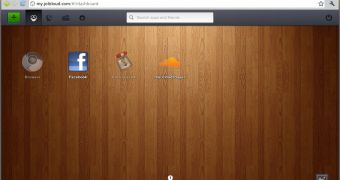Jolicloud 1.2 and Joli OS 1.2 are now available, the first releases following the new strategy at the cloud desktop company. First of all, the operating system has now been renamed Joli OS. Second, Jolicloud plans to expand beyond the Chrome Web Store.
Just before Joli OS 1.2 came out, the company announced that the OS, aimed at netbooks in particular, will be changing its name and its focus and that the company as a whole is shifting strategy.
Rather than being a cloud OS, a la Chrome OS, that can also run native Linux applications, Jolicloud is looking to become a cloud desktop, a way of accessing your favorite apps and files from any browser or device.
For now, there is a Jolicloud web app for Chrome. Later Firefox 4, Safari 5 and possibly others will be supported. There will also be a mobile version for the iPad, but it won't be a native app, rather a HTML5 port.
This may seem like a strange approach, but Jolicloud would clearly be in violation of several App Store policies since it enables users to run other apps inside it. Eventually, there will also be an Android version.
In the meantime, the stand-alone operating system with Ubuntu underpinnings will be renamed Joli OS, to avoid confusion, and will be marketed as a way of making the most of older computers that may have problems with modern operating systems but that can run a browser and web apps just fine.
"Since our 1.0 launch back in August, more than 300,000 of you have created a Jolicloud account. It seems that you enjoyed our selection of 1000+ apps because you have installed more than 3.5 million of them so far," Jolicloud wrote earlier this week.
"Back in December, we introduced a Web only version of Jolicloud for the Chrome Web Store. That app has already reached 60,000 installs and is now among the top 40 most popular apps," it added.
"This success has convinced us that we now have to expand our experience beyond our own OS to be relevant on other platforms," it announced.
With this new strategy, Jolicloud seems poised to conquer a lot of platforms. The question remains the same as for any other web OS or the more fashionable term, cloud OS, before it, will users see the point of running an operating system within a browser which runs in, well, another operating system.

 14 DAY TRIAL //
14 DAY TRIAL //